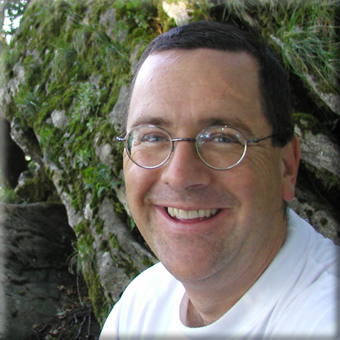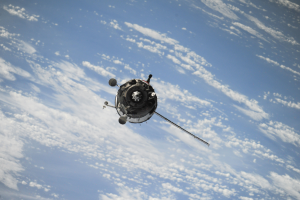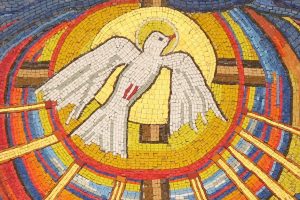A Franciscan environmental activist recycles some ancient traditions for modern use.
[Read more about St. Francis, patron of ecology.]
Hundreds of years before the environmental movement, St. Francis of Assisi recognized God in creation and changed his life. Today one of his spiritual sons, Keith Douglass Warner, O.F.M., is encouraging Catholics to do the same.
But while Warner holds up St. Francis, patron of ecology, as a prime example, he doesn’t expect 21st-century Catholics to live in a cave for half the year, survive on nuts and berries, or preach to birds. We need to regain the “sense of enchantment” that St. Francis had, Warner says, and we can do so by gardening, taking a walk in the park, changing our diet, and praying.
How exactly can prayer solve complex issues like climate change? The problem, Warner says, “is more fundamental. The most important problem is that we go to church and hear all of these teachings, but it doesn’t affect us because we’ve so fractured our identity.”
So yes, experiencing God in nature is not only the Catholic thing to do, but it is also the first step to caring for creation. “I have the privilege of living at a rural retreat house, so I get to see beauty and a whole host of God’s creatures every day that I’m at home,” he says. “That prompts me ever more fully to love and express gratitude to God for the gift of creation.”
What’s the single most important thing that Catholics can do to protect the environment?
Practice contemplative prayer. The fundamental problem is that we are alienated from God, ourselves, and the earth, and it’s through prayer that we can come to understand where we belong.
It’s our apathy, our consumerism, and our materialism that distract us from what’s most important, and it’s in that context of prayerful reflection upon our relationship to God that we can grow and accept our responsibility.
Is Catholicism really a nature-friendly religion?
Creation has been very important throughout the history of Catholic thought and teaching, but the current emphasis of both Pope Benedict XVI and his predecessor, Pope John Paul II, on creation comes as a surprise to many Catholics. Somehow we’ve allowed our thinking about creation to be more influenced by our culture than by our Catholic tradition.
To love the earth is a sacred responsibility, but this idea has been lost. It’s not just Catholicism that has lost its awareness of the importance of creation. This has been part of a broad erosion across religions, at least in the West.
Are we just throwing holy water on a secular environmental movement?
I don’t think so. What people have talked about in the U.S. Catholic Church, especially the bishops in their 1991 letter Renewing the Earth, has been the notion of a distinctly Catholic environmental approach.
What makes it distinctly Catholic?
It has a much stronger emphasis on ethics rather than on individual issues. You are more likely to have tactical influence on the political process if you are issues driven, but I think most Catholics prefer to have a broader moral vision and are trying to understand what it means to live a more holistic life.
Catholic environmentalism also focuses on its integral connection to our vision of humanity in society. We’ve added environmental justice, the idea that the poor shouldn’t bear an unfair burden of environmental degradation, as a theme within Catholic social teaching.
While this is important, I would say that it needs to be complemented by a spirituality of care for the earth, of love, gratitude, and prayerful relationship with the earth. That is what I think is most needed and most missing.
I think that so many people are repelled by the secular movement because they see it as driven by anger, not love. It makes people feel guilty rather than grateful and energized. That’s a real challenge because if you just look at the data, it’s really grim, verging on apocalyptic.
How do you find that spirituality of love and gratitude?
People have to open their eyes, and they have to go out and have a sensory experience of nature. I can point to the example of my father, St. Francis, here.
I don’t think there are too many climate change deniers who have a direct sensory relationship with the earth. Many people have undergone very important transformations as a result of sustained contact with nature, whether it’s rafting in Colorado, camping out in their local state park, or gardening.
I don’t mean to sound trivial or cutesy here, but gardening can be a spiritual practice if you think of the cultivation of our own spirit and not just vegetables. Humility is instilled by the failures in gardening, and there’s the potential for really luxurious sensory experiences, such as eating a fresh vine-ripened tomato from your own garden.
It has the potential to transform so much of the modern or post-modern malaise of the human spirit.
But isn’t there a danger of people leaving the church to go find God in nature?
I never really understood why people seem to think this is an either/or issue, and I would point to myself as a contrary example. I find God in nature and I find God in the church community.
I don’t understand how those who hear Genesis or the Gospel of John proclaimed in church can fail to see the connection to what happens outside the walls of the church. St. Francis is the example that says you can love creation and be a Catholic saint.
How did this connection develop?
Early Christian writers thought that we had to understand humanity’s relationship to creation in order to understand our relationship to God. These were systems-human, creation, God-and we need to understand how they fit together.
The doctrine of the “primacy of Christ” emphasizes that before the beginning of creation, the cosmic Christ was intended to come in human form. “He is the image of the invisible God, the firstborn of all creation,” St. Paul writes in Colossians 1:15. “In the beginning was the Word,” begins the prologue of John’s gospel (1:1).
Incarnation is not just a remedy for a problem, a response to sin, some said, but the highest, best form of conveying God’s love. Humanity is a part of creation, and all creation, not just humanity, is able to bear Christ. Therefore, creation is born in a special dignity.
This understanding of Christ was conceived long before there was an environmental movement. But it’s a resource that is fully a part of our Catholic history, and it reflects in a more formal way what St. Francis knew intuitively. These kinds of insights are in desperate need of retrieval and renewal to re-imagine our relationship with the earth today.
What changes when we start thinking of humans as part of creation?
Modern society is driven by a radical dualism-by a fundamental assumption that can’t even be questioned-that we are apart from and superior to nature. This came, I would argue, as part of the package with the Enlightenment. It privileges humanity and is outraged at the notion that we somehow are to be a part of creation.
This leads to problems when we ask who is included in our moral community. We assume that the only things that matter are human beings. We do not consider the fate of Earth’s diversity of life or even acknowledge that we are part of a community, an ecosystem, that is being dramatically transformed by humanity.
When I started down the Franciscan vocation path about 20 years ago, I thought that I would become a religious environmental activist. But as a result of prayer and reflection, I’ve come to realize that the problem is much more serious than I originally realized because it has to do with our mentality, our selfishness, our sinfulness, our greed, and our unwillingness to consider future generations.
It’s a bit like getting the atom bomb. We’ve developed technologically, scientifically, and economically, but we have not developed morally in such a way that we’re able to make wise choices.
It’s not any one individual. It’s all of us together. This is where the Catholic communitarian vision is important. We’re moral agents within a moral community, and that moral community extends its care beyond humanity.
That might sound abstract or philosophical, but it’s so fundamental to being able to get us going on the right path.
But shouldn’t humans be central to the moral community, especially the poor?
Concern for the poor is one of the distinguishing features of Catholic environmentalism in contrast to secular environmentalism. This is where the notion of environmental justice comes in. It is the environmentalism of where we live, work, and play, not just an environmentalism that is concerned about what’s happening elsewhere.
The vision is to incorporate the poor more fully into the human community, at the same time as we situate the human community within the earth community. What that means then is that the economic standards of people at the bottom need to be brought up, making it all the more incumbent upon us who are wealthy to simplify our lifestyle and create a more just global economic system.
It would be nice if we could all just pick out one little thing to do, but that’s not the Catholic vision, especially given the enormity of the social, economic, and environmental problems we face.
What about where these two interests-the environment and the poor-collide, as with carbon emissions in developing nations?
That’s where we have to draw on our tools for moral theology. It’s when a decision is 51/49 that you need ethics.
With the question of who should bear the responsibilities of cutting carbon emissions, I think we have to look at history. The United States and Europe have historically created 80 percent of all the carbon emissions, so it’s our responsibility to dramatically reduce our carbon footprint first. And yet there’s no reason for it to happen unless the citizens of these countries demand it. We think of it as somebody else’s problem.
I don’t want to diminish the moral dilemmas that are in our path forward, but I think we need to rethink how we frame questions, taking a bigger perspective.
We know that we can sin against God and other human beings, but can we sin against the earth? Take mountaintop strip mining in Appalachia. Is this sinning against the mountains?
Have you ever prayed the psalms? And do not the mountains and rivers give praise? Absolutely.
The theological problem of dismantling a mountain did not concern the people who wrote scripture or theology. We have a new moral problem here. There has to be, I would argue, a re-emphasis on wisdom and restraint.
From my perspective, it is really an astonishing conceit on the part of human beings that we could destroy mountains. It’s breathtaking in its arrogance. And sin means to break relationship, to withdraw oneself through one’s conceit and arrogance, to put oneself above the rest of life, whether human community or earth community.
We’ve got this idea that we can only sin with the parts in the area of our pelvis. This very narrow understanding of sin is a fundamental obstacle to expressing our social and environmental responsibilities as Catholics.
Is it productive to talk about sin and guilt in this context?
From a pastoral perspective, it’s problematic to talk about sin without also talking about God’s love and grace and forgiveness.
It’s important to recognize that we have responsibilities as human beings, especially given our incredible array of technology that can hurt the earth. But we also have to ask: What do we need to do as penance to remedy the situation?
Francis expressed penance in a social context. He longed for the early friars and sisters to live in humility and with very little for themselves, living a life of generosity toward others as a response to God’s love.
We can do ecological repentance through things such as restoration of the earth, limiting our carbon emissions and use of fossil fuels, using local foods, eating vegetarian, buying fair trade and organic.
You’ve said that parish priests are largely absent in this movement. Why is that?
I’m not here to bash priests. Part of the context is full pews, empty pulpit. We put twice as much responsibility on every priest these days.
Then you also have this relatively new area in environmentalism. Most priests are not trained to be teachers in novel areas. It’s reasonable and appropriate to expect that we should be led in this area by the people who are supposed to be our teachers: our bishops. A small number of bishops have been visionaries here, but then of course, they’ve got a few other problems on their plate, too.
Regional examples-such as bishops’ letters on the abuse of natural resources in Appalachia and the pollution of the Columbia River watershed in the Pacific Northwest-are really quite creative and show us the way.
But I am saddened that a few priests stand in the way of action. They’re missing the point of what the popes have told us about the need for Catholics to take seriously our collective moral responsibilities and act. Our pope says it is fundamental to our identity as Catholics to care for the earth. No one is off the hook
What keeps people from taking environmental action?
I can’t really imagine how people could think of themselves as Catholic and ignore all this.
The most transformative contribution that I have been able to make is when I lay out my vision, and people begin to see the facets of their identity-I’m a Catholic over here and I’m an environmentalist over here-as integral to each other. They say, “Wow! This is exciting. There’s no reason I can’t love the earth and love God!”
American culture has some really bogus ideas about environmentalists. Just like my students say they’re not feminists, they also say they aren’t environmentalists. Who wants dirty air and contaminated water and a disrupted climate? No one. But many people don’t want to be associated with activist labels.
That’s why we have to more clearly articulate environmental responsibility with Catholic identity.
What about people who deny that we’re doing any harm to the environment?
We have to engage people in many ways. A climate change skeptic doesn’t believe all of the unambiguous evidence and scientific consensus of the disruption of the planet. At that point I pivot very hard back to tradition.
As a Franciscan, a member of an 800-year-old order, I think we need to bring forward the best wisdom and practices and insights from our tradition to bear on the present. Take the practice of virtue. How is a climate change denier practicing virtue, simplicity, living charitably?
The notion of fasting would be helpful here. It’s the notion of self-control, living with less, and allowing that to inform our practice of humility, rather than “I can have anything I want, any time and all the time.”
Fasting allows us to make a radically countercultural decision collectively, as a church, to say, “Our satisfaction is in God. We do not need all these extra things.”
But I would push fasting beyond just eating fish-the state of the world’s oceans and its fisheries is really quite dire, as we are polluting or fishing the fish to extinction-to eating a vegetarian diet. It’s also a way of practicing solidarity with billions of people who don’t have access to meat.
How else can we do penance inspired by St. Francis?
Where can you pray outside? It doesn’t have to be a wilderness. I’m not suggesting you go to the Amazon. You can take a walk in a park or maybe there’s an aquarium or a natural history museum. From a classic spirituality perspective, there’s a movement out to engage and to receive God’s love, but there’s also a going within, a sense of silence and darkness and contemplation and solitude.
Reduce your carbon footprint. Eat vegetarian for all of Lent. I’ve done it. Francis did it. People have done some pretty audacious things by efforts to become locavores, eating locally.
The subtitle of Gandhi’s autobiography is The Story of My Experiments with Truth. He saw his life as a set of experiments that he conducted to see what it meant to be human and how he could live in greater compassion in relationship to other people and more fully advance an ethic of nonviolence.
How can we live ever more fully in love? Yes, we need some self-sacrifice in the United States, but we can complement it with growing in love.
This article appeared in the April 2010 issue of U.S. Catholic (Vol. 75, No. 4, pages 22-26). It accompanies St. Francis: Patron of ecology.
Image courtesy of Keith Douglass Warner, O.F.M.













Add comment